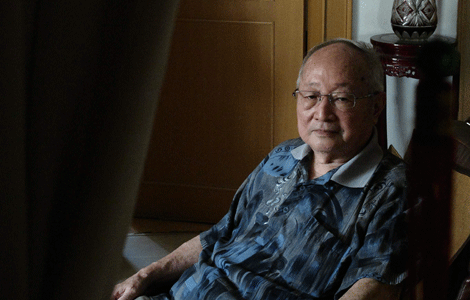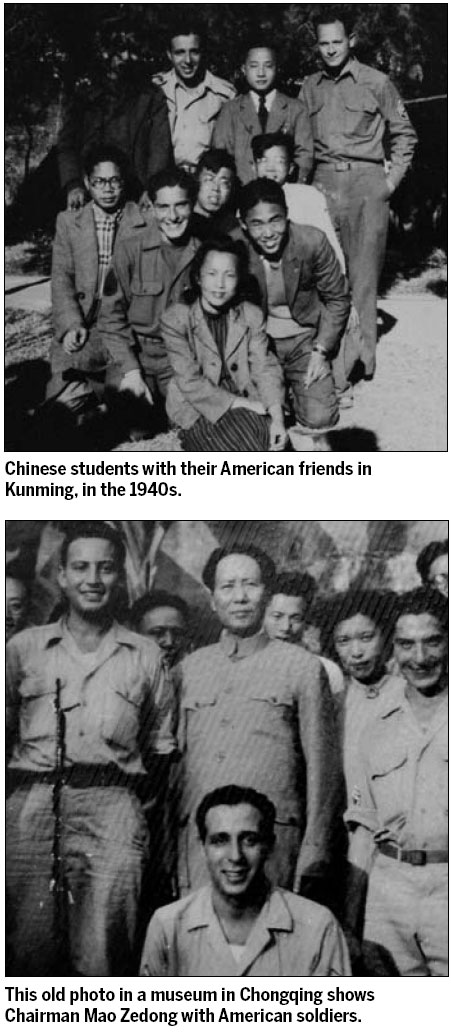People
Friends in need, friends indeed
Updated: 2011-08-31 07:51
By Liu Wei (China Daily)
|
 Former journalist Zhang Yan, 89, says his friendships with some American soldiers started in Kunming in the 1940s. Jiang Dong / China Daily |
An association with members of the Flying Tigers that started in a bookstore in 1944 survives McCarthyism in the US and the 'cultural revolution' in China to endure to this day. Liu Wei reports.
Despite the many ups and downs in relations between China and the United States in the past 60 years, people-to-people links, says 89-year-old Zhang Yan, will always remain strong. The Chinese journalist points to his own lifelong friendships with some American soldiers, forged in the chaotic 1940s, to support this. It all started in a bookstore in Kunming, Southwest China, in 1944.
Ma Shitu, a student of the prestigious National Southwestern Associated University, formed by the merger of Peking University, Tsinghua University and Nankai University in the war years, was browsing the shelves when he found two US soldiers reading a book on Soviet literature.
"Interesting, isn't it?" he initiated the conversation, curious about their interest in the subject.
The young soldiers, who introduced themselves as Dick Pastor and Morris Wald, were members of the US 14th Air Force, also known as the Flying Tigers, stationed in Kunming. The US military had stepped in to help China defend itself against Japanese invasion during World War II.
They were thrilled to see someone who could speak English, and asked Ma where they could find more English books, especially those about the Communist Party of China and its revolutionary bases.
The three continued their talk in a teahouse nearby and soon became friends. Later, Ma introduced them, and some other US soldiers, to his schoolmates, including Zhang. "We became friends because we shared the same views," Zhang says. "We both believed that the world had to be different after the war. We wanted, in China and the US, a new society where people live in equality and justice should be built."
Every two weeks the US soldiers and Chinese students would gather in a teahouse, or park, or on a boat. They would talk about the war, the two countries' relations, and share personal experiences.
Zhang remembers clearly how he and five others spent a whole day interpreting a long article by Chairman Mao Zedong for their American friends.
When the Chinese students organized patriotic demonstrations, the US soldiers helped them perfect the English leaflets.
Zhang was even invited to the soldiers' barracks, together with a staff member of the Young Men's Christian Association named Li Chuwen.
One summer evening, two soldiers, Edward Bell and Howard Hyman, drove them to a conference room, where many US officers and soldiers were waiting. Bell invited Zhang to talk about the Communists' revolutionary bases.
Before he started his speech, a US officer took out his camera, but was immediately stopped by Li, who said Zhang was a shy person.
Their visit to the US barracks was later investigated by the Kuomintang authorities. Fortunately, the Chinese had used only their English names, and thanks to Li's prudence, no photo evidence could be found.
If at first Zhang, a passionate advocate of Communism from the time he entered university, saw the US soldiers as a group China should win over, as they began to know each other better, they gradually built a personal bond. The soldiers even allowed him to read their letters from their parents.
In an article written in 1974, Pastor recounts how his Chinese friend touched him.
In December 1944, Japanese troops invaded Guizhou province. Kunming, in neighboring Yunnan province, was in danger.
At 3 am one day, Pastor found someone shaking his shoulder. It was Zhang Yan.
"He told me he had cycled some 13 km from a meeting where our report of the military threat had been discussed," Pastor writes.
"The meeting ended, he said, with a decision to invite us, seven Americans, to join them in their underground political unit in the event that the attack came, so that they could protect us and escort us to our next destination.
"The attack never came, but I remember that invitation as a beautiful example of solidarity and friendship between our two peoples."
From the very beginning, Zhang's friendship with these soldiers was heavily influenced by the course of China-US relations. It continued to zigzag after the war, but all of them always believed their friendship would endure no matter how relations between the two countries turned out.
When the People's Republic of China was founded in 1949, the US government broke with China. Zhang's connection with these soldiers was cut off for the next 30 years.
During the 1950s' McCarthyism in the US, Pastor and other members of the GI group were persecuted for supporting the recognition of New China. They had to bury photos showing them with their Chinese friends.
Likewise, during the "cultural revolution" (1966-1976) in China, Zhang was labeled an "international spy". He was deprived of his journalist job and exiled to rural Henan province.
As early as in 1972, following late US president Richard Nixon's "ice-breaking visit", Pastor and his wife made their first trip to China after the war. "He inquired about the whereabouts of his Chinese friends wherever he went, as if he were looking for his kin," Zhang says.
However, the "cultural revolution" was at its height and Zhang was doing manual labor in a village in Henan.
Pastor had no way of finding Zhang and his other friends. In fact, even if he had found them, they would not have been allowed to see him.
Following Pastor, Bell and Hyman, who had invited Zhang to their barracks, also visited China in 1976.
Their repeated efforts to establish contact also failed, but to their surprise they found an old photo of themselves and Chairman Mao in a museum in Chongqing. It was shot in 1945 before they returned to the US. Museum staff told them that the photo had been there since 1958, even though the two countries had not established diplomatic relations then.
"Howard (Hyman) was very proud of this, it touched his heart, the friendships were a very, very big part of his life," says David Feldman, Hyman's nephew, in a documentary on the story of Zhang and his friends.
"They were moved, because their experiences in China had been cherished, even when relations between the two countries were hostile," Zhang says.
But their dream of a reunion was not realized until the normalization of China-US relations in 1979. The same year, Zhang became the first Washington correspondent of People's Daily.
The first thing that Zhang saw after he arrived in his new office was a bunch of tulips. His old friends Bell and Hyman, then living in New York, had sent them.
He called them immediately.
"We have waited for 35 years. We cannot wait any more. We will be in Washington tomorrow," they said.
Their friendship continued. Zhang's old friends helped him organize interviews and introduced him to their children, friends and neighbors. Even after his career as a newspaper correspondent ended two years later, Zhang visited them frequently in the US.
They also met up with some of their other old friends, including Ma Shitu, in 2004, in Kunming, where they first met.
Most of the US veterans actively promoted China-US relations. Pastor, for example, worked for the American Committee in Aid of Chinese Industrial Cooperatives and later for the US-China Peoples Friendship Association (USCPFA), a nationwide popular organization, from the 1970s.
Feldman, Hyman's nephew, was a teenager when he came to China with his uncle in the 1970s. He has adapted the stories of his uncle and his Chinese friends into a novel called Born of War: Based On a True Story of American-Chinese Friendship.
Most of Zhang's US friends, such as Pastor, have died. Pastor, who was 90 in 2008, did not fulfill his dream of seeing the Beijing Olympics. "He watched it happily and closely from heaven," Zhang says.
Chen Defu, a 73-year-old filmmaker who has made a documentary on Zhang's story, contributed to this story.


Specials

Jewel of the south
Zhuhai in South China has a wealth of natural allure that is open for business.

China in vogue
How Country captured the fascination of the world's most powerful fashion player

More than just a game
Mahjong is a deep-rooted cultural tradition that touches every level of society